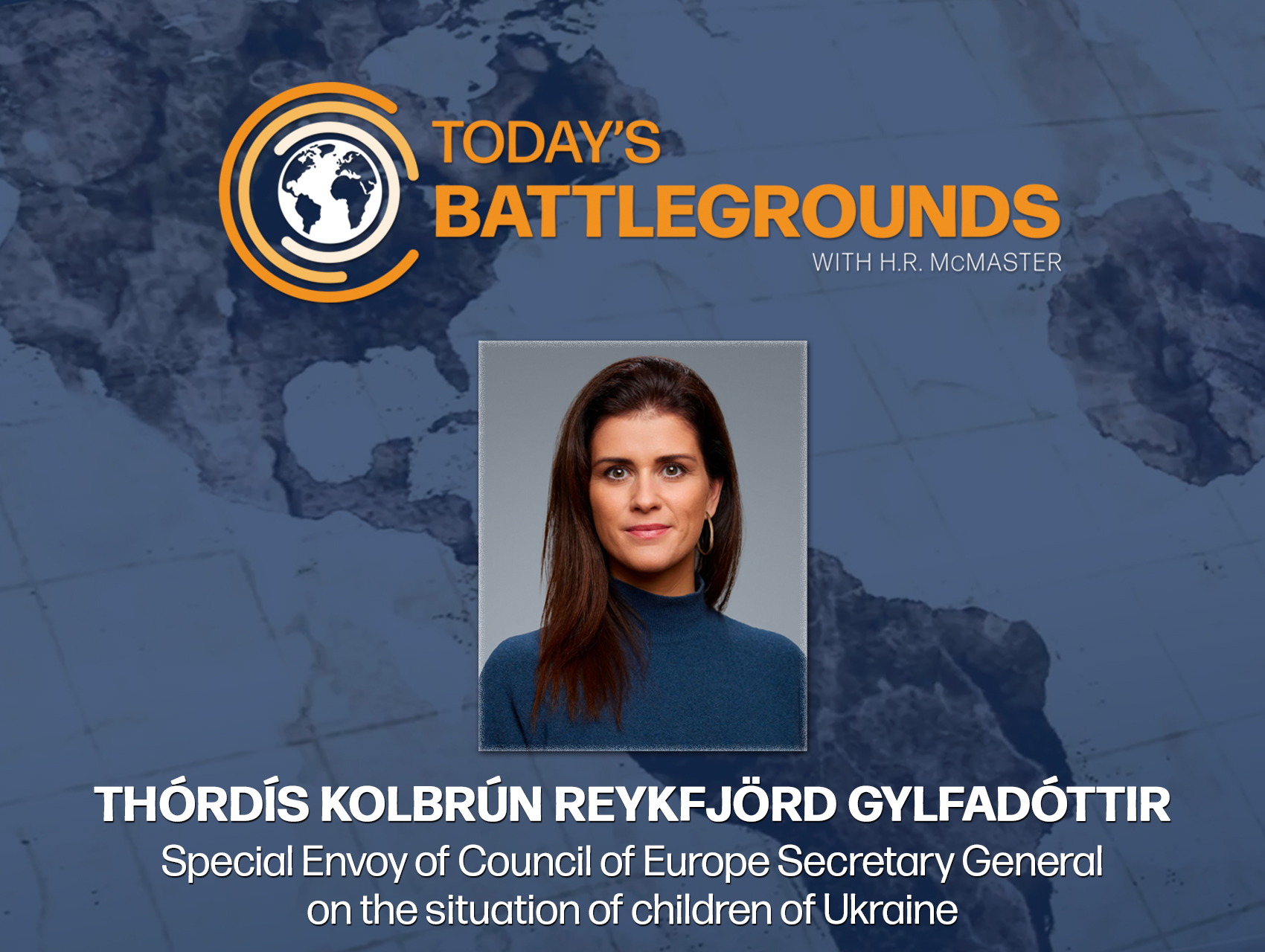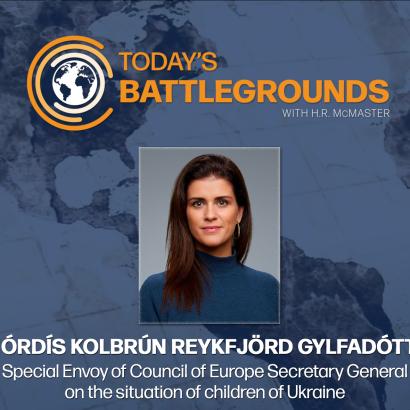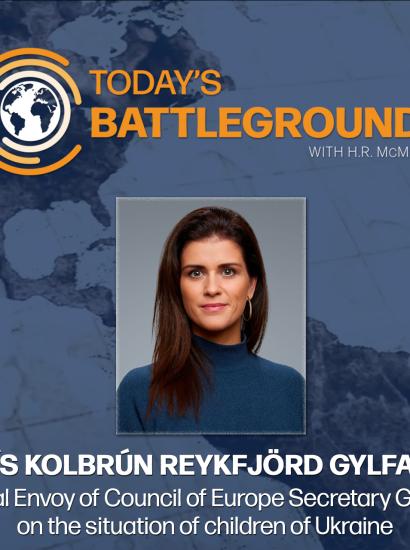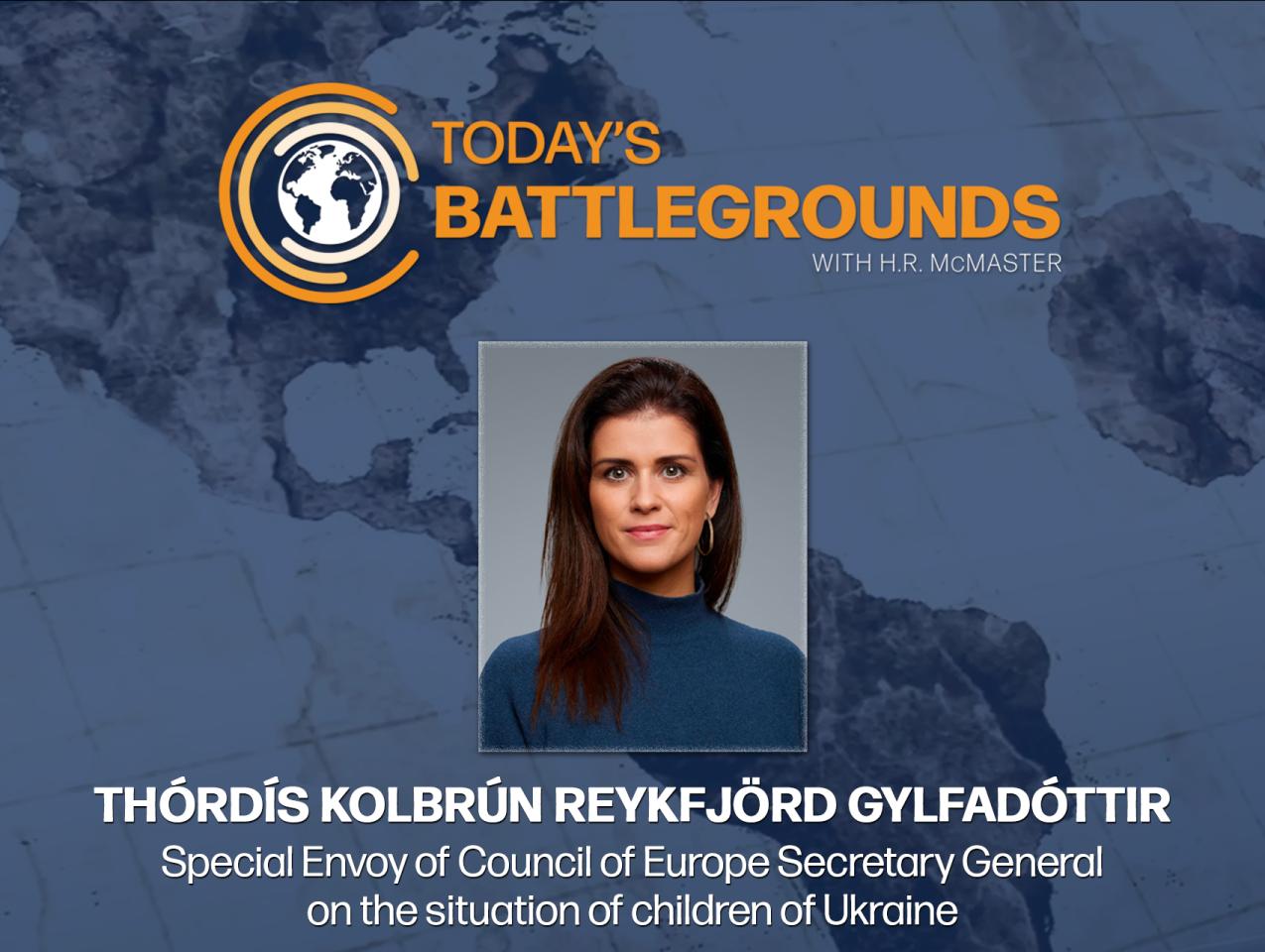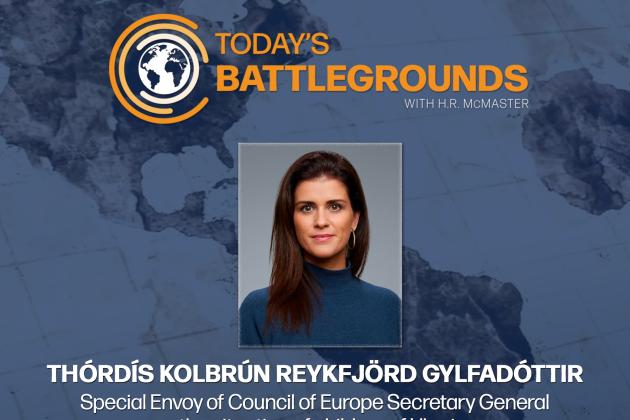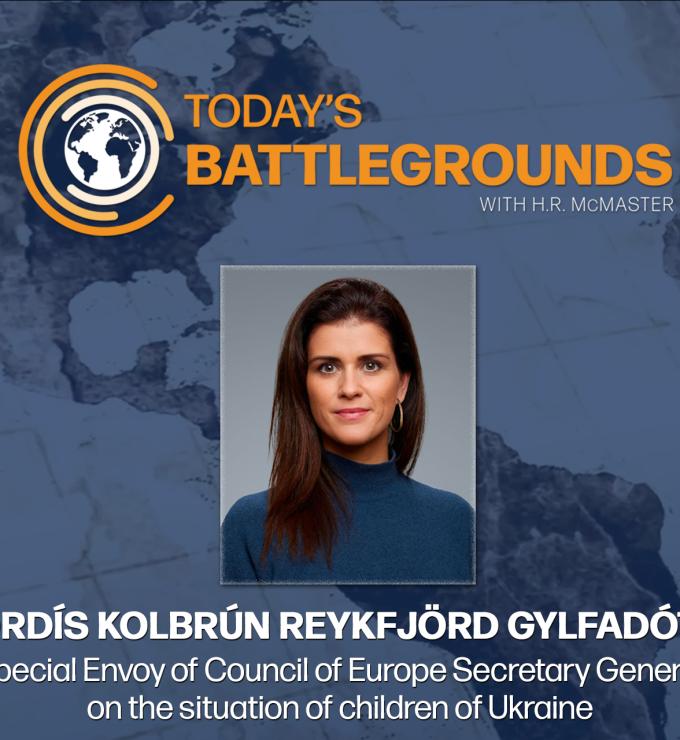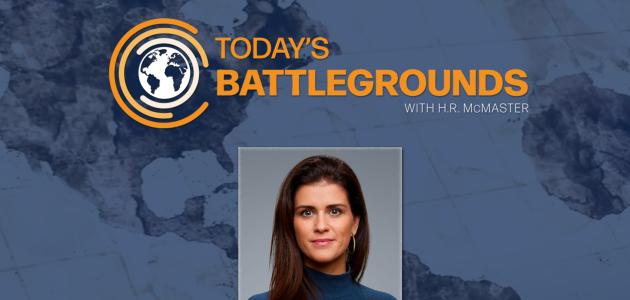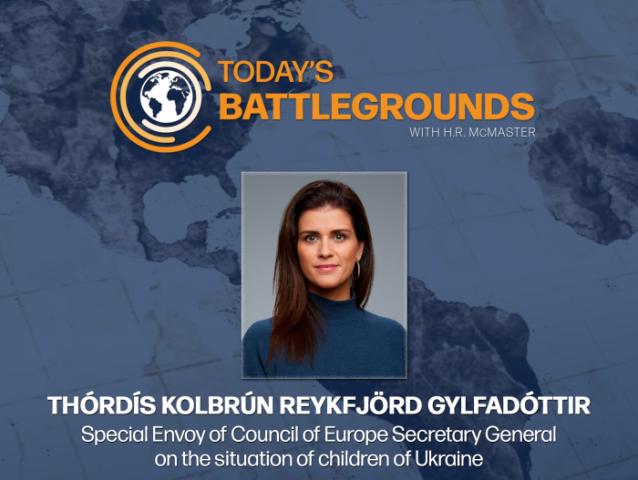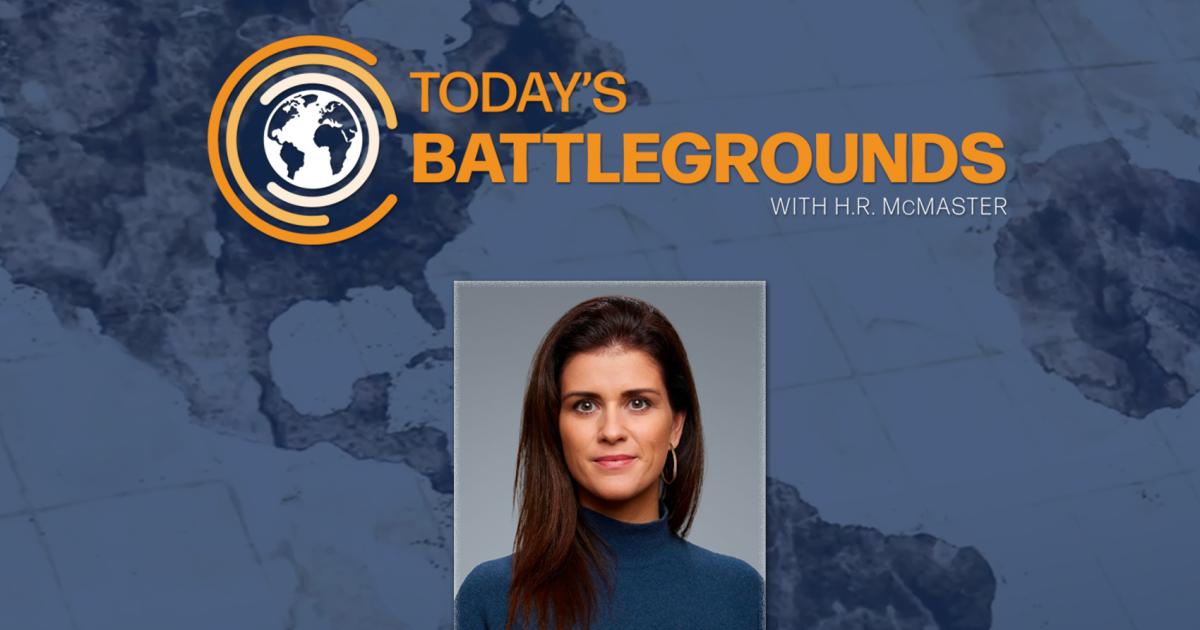- Security & Defense
- International Affairs
- Determining America's Role in the World
Join Thórdís Kolbrún Reykfjörd Gylfadóttir, Iceland’s former Minister of Foreign Affairs, and Hoover Senior Fellow H.R. McMaster, as they discuss the evolving U.S.-Iceland relationship, Icelandic-European relations, and the continued security challenges of the Arctic. Appointed as the Special Envoy of Council of Europe Secretary General on the situation of children of Ukraine, Gylfadóttir provides an insight into her vital role in raising awareness of the challenges facing the children of Ukraine, the driving forces behind Putin’s behavior, and why sustained support for Ukraine from Europe and the US is critical. Iceland a founding member of NATO, Gylfadóttir discusses the importance of NATO to transatlantic security from an Icelandic perspective, the importance of the transatlantic relationship in the fight against Russia, China, North Korea and Iran, as well as current priorities for the US-Iceland relationship and why Americans should experience a visit to the country of Iceland.
Recorded on May 27, 2025.
WATCH THE VIDEO
>> H.R. McMaster: America and other free and open societies face crucial challenges and opportunities abroad that affect security and prosperity at home. This is a series of conversations with guests who bring deep understanding of today's battlegrounds and creative ideas about how to compete, overcome challenges, capitalize on opportunities, and secure a better future. I am H.R. McMaster, this is Battlegrounds.
>> Speaker 3: On today's episode of Battlegrounds, our focus is on the country of Iceland, a longtime US partner and NATO ally. Our guest is Thordís Kolbrun Reykfjord Gylfadottir, the Special Envoy of Council of Europe's Secretary General on the situation of children of Ukraine.
Gylfadottir previously served as Minister of Foreign affairs from 2021 to 2023 and once more in 2024, Minister of Finance and Economic affairs from November 2023 to April of 2024. Minister of Justice and Minister of Tourism, Industry, and Innovation from 2017 to 2021. She was the youngest woman to serve as minister.
Since 2016, Gylfadottir has represented the Independence Party in Iceland's Parliament, the Althing, and was appointed Vice Chairman of the party in 2018. She holds a master's degree in law from Reykjavik University. Iceland is a volcanic island characterized by active and dormant volcanoes, lava fields, ice fields, and numerous sources of geothermal energy.
Its population is roughly 400,000 people, comparable to the US state of Wyoming. Iceland was first settled extensively by Norse peoples during the Viking Age in the late 9th century. In the following centuries, Icelanders established the Althing, one of the world's oldest parliamentary institutions, adopted Christianity, and in the mid-13th century pledged allegiance to the Norwegian crown.
The following centuries were marked by hardship and including plagues, deforestation, and economic competition with the British over the fish trade. In 1550, the execution of Catholic Bishop John Arison concluded Iceland's Lutheran reformation and marked the end of its medieval era. Soon after, the Danish monarchy imposed a trade monopoly that lasted for two centuries.
Iceland reestablished the Althing as a consultative body in 1845. Denmark subsequently granted it legislative power over internal affairs in 1874, followed by home rule in 1904. In 1918, Iceland achieved full sovereignty under the Danish crown through a union treaty that lasted until 1943. In 1940, German soldiers occupied Denmark, while British soldiers occupied Iceland until the United States assumed defense responsibilities in 1941.
These occupations dissolved the union with Denmark. On June 17, 1944, Iceland declared itself a republic following a public referendum. Iceland joined NATO in 1949 and engaged in three cod wars with the United Kingdom between the 1950s to 1970s to assert control over its maritime and fishery boundaries. Iceland joined the European Free Trade Association in 1970 and the European Economic Area in 1994.
The United States was the first nation to recognize Iceland's independence in 1944. The two countries signed a bilateral defense agreement in 1951. Although the United States withdrew its permanent forces and closed Naval Air Station Keflavik in 2006, it reaffirmed its defense commitment. Today, the United States remains a key economic partner and one of the largest foreign investors in Iceland, particularly in the aluminum sector, supported by the 2009 Trade and Investment Framework Agreement.
We welcome Thordis Kolbrun Reykfjord Gylfadottir to discuss the evolving US-Iceland relationship, Icelandic-European relations, and the continued security challenges of the Arctic.
>> H.R. McMaster: Minister Thordis Kolbrun Reykfjord Gylfadottir, welcome to Battlegrounds, it's great to see you again. Thank you for joining us at this critical moment to help us understand your perspective on the challenges and opportunities we're facing internationally.
Great to see you again.
>> Thórdís Kolbrún Reykfjörd Gylfadóttir: Great to see you, too. Thank you so much for having me.
>> H.R. McMaster: Hey, so what I'd like to do is begin with your current portfolio. You are a humanitarian, and you have this portfolio now to catalog some of Russia's war crimes and crimes against humanity.
As well as to seek the return of over 30,000 children who have been kidnapped by Russia during its war against Ukraine. Can you talk to us about the scope of your responsibilities and maybe what you think our viewers need to know about the horrors that have been inflicted on the innocent people of Ukraine?
>> Thórdís Kolbrún Reykfjörd Gylfadóttir: Absolutely, well, yes. So the Secretary General of the Council of Europe, not the European Union but the Council of Europe, appointed me last February as his special envoy on the situation of the children of Ukraine. And the portfolio is quite broad. So it's on the situation of the children of Ukraine that live in the member states because, of course, a lot of them live in Europe, but also the ones that live in Ukraine.
And then on the unlawfully abducted children or the stolen children. When it comes to the first part on the children that live in member states, that's more like already has a clear framework. There's a lot of work being done within the Council of Europe in good cooperation with other institutions, member states, and so forth.
Regarding the children that live in Ukraine, of course, I mean, I would say that the trauma work is the most important one. And it is important to advocate and facilitate the need to focus on trauma because everyone understands, and we all talk about reconstruction and the need to rebuild Ukraine.
But too often that's a focus on infrastructure, roads and bridges, and energy infrastructure. But you can't really rebuild the nation that is fully traumatized if you don't focus on the trauma care, especially the younger generation that is the future of the country. On the stolen children, that's obviously the most challenging one, I mean, the Council of Europe is not in direct contact with the other side.
So there it's more about raising awareness, keeping it on the agenda, push for it to be a priority, like the Ukrainian government and the Ukrainian people are doing. If and when it comes to any form of ceasefire and the aftermath on peace negotiations, that this is a part of what has to be done.
You can't talk about peace if it's not just. And you can't talk about just peace if you have tens and thousands of children that were stolen from their parents, guardians from their motherland and taken to Russia. It's also to make sure that we manifest and track them. And there are very important projects ongoing when it comes to tracking children, I mean, the Yale research, Research lab and that project, I mean, they are tracking 35,000 children in very many locations.
So we have to make sure that that will continue because, I mean, accountability is very much linked and you can't take that away from future steps, no matter how they will look like or turn out to be when it comes to the future of Ukraine. So this is a very, I'm honored that I'm able to be in this position that I was trusted to be in this position.
I feel like I should, basically use 24 hours every day to spend on it. But I am also a member of parliament in Iceland in opposition now after eight years in government. So it's a balanced work, but many new roles. And I'm a very fortunate person to be able to focus on and fight the good fight.
>> H.R. McMaster: Well, I mean, I think all of us should be grateful for what you're doing and your leadership in this cause. And in a previous episode of Battlegrounds, we talked with David Schwendemann about crimes against humanity. War crimes were being committed in Ukraine and he was the person who gathered so much of the evidence in, associated with the crimes against humanity in the Balkans in the 1990s.
And so it's so important, the work that you're doing to keep it visible. And I will try to do our best too, here to keep talking about the children and, and the importance of keeping the Yale project open as well, which was threatened to be shut down by this DOGE effort here in the United States.
But then I think people realize what a tragedy that would be.
>> Thórdís Kolbrún Reykfjörd Gylfadóttir: Yeah, I mean, that really would be a tragedy because if the project stops, you cannot like restart in some months. I mean, if you stop tracking, you lose them. For the American people, like for everyone else, for every normal human being, it is fundamental to understand and to know that this is happening, this is happening in real time.
Those children are alive, if we compare that to horrific things that have happened in the past, that's not always the case. So this is worth fighting for. And I would say that no matter where you stand, even though this full scale invasion war of aggression is of course as black and white as it can get basically in a very complicated world.
But no matter where you stand on that, I think every normal human being understands and feels in its heart how awful and wrong and horrible it is to literally steal children from their families from their motherland to brainwash them. To put them up for an adoption, to tell them that their motherland is horrible or that it's non existing and you forbid them to speak their language and you take away their culture.
I mean, everyone understands that. So even if you would only fight for that and you would understand that this has to be fixed and those children have to be able to return back to their motherland. If we could all agree on that, that would be the right thing and a very human thing to do.
And then people can have opinions on other items that are clear in my mind. But this is as clear as it gets.
>> H.R. McMaster: This week, President Trump thought, said he thought Vladimir Putin was crazy because of the continued onslaught against Ukraine. He saw a huge intensification of the drone and missile attacks against residential areas, more children killed on playgrounds.
And of course, the ongoing atrocities that are occurring across the country in the occupied territories, for example, where, as you mentioned, they're brainwashing children to hate their motherland and filling their heads with Russian propaganda. But could you maybe talk a little bit about, I don't think you were surprised by this ongoing brutality, I wasn't either.
I'm glad President Trump is realizing really how intransigent Putin will be because he's determined to continue this onslaught against Ukraine. What could you share with our viewers what you think Putin wants? Describe what you see as maybe the sources and the drivers of Putin's behavior and this sort of hyper nationalist class of leaders who are in charge in the Kremlin?
>> Thórdís Kolbrún Reykfjörd Gylfadóttir: Yeah, well, first of all, I mean, every day the Russian Federation has an opportunity to show whether it wants peace or not. And every day they show that they do not want peace. I mean, that we see in the news every single day, in every action that they pursue every single day, people ask, how can this be fixed?
I mean, this would be fixed if Russia would just leave the territory which is not theirs, and the war would stop. And if we ask who's in the right and who's in the wrong, I mean, Russia has stolen all these children. Let's just take that example once again.
How many children has Ukrainian people stolen from Russia? Zero, I mean, this is, and for Putin, I mean, they are quite clear about the fact that it is about Ukraine, it's about all of Ukraine. They don't look at Ukraine as an independent sovereign state with their own language and culture.
And they actually don't stop there. I mean, their narrative and points on other countries, even NATO countries, it's also quite clear. So in my view, it is very obvious that they won't stop until we stop them. And the Ukrainian people are doing whatever they can. I mean, if we just think, how would a lot of other countries react in this situation?
I mean, their bravery and their spirit and their fight, because they are not only fighting for their territory, they are fighting for their future. They are fighting for a different society. I mean, when Zelenskyy was elected, it was with 75% because people were fed up with oligarchs and corruption.
And they've already made a decision to be a part of the transatlantic family. They don't only hang their Ukrainian flags outside. They only have the flag of the European Union, even NATO flag, because they have already made a decision where they wanna belong, because they know that freedom is better.
They know that a society which actually respects the individual freedoms of every human being, with a rule of law and institutions that are not corrupt, is a recipe that works for people. That's why he was elected, that's why they are fighting this war, because they're literally fighting for the society that they so desperately want.
And that's what frightens Putin. For him, it's also not only about territory, it's not only about resources or just to say, now I have a bigger land. He's afraid of the fact that the countries neighboring Russia will move forward, have stronger societies, because that's not what he's offering his own people.
So it's better to have a buffer zone that is basically a weaker. Version of yourself. So, that's the threat. That's the strong man, that's the threat that really he is facing. And when you compare it, I mean, to the Baltic states or Poland, I mean, when the Baltic states regained their independence, they were poor.
If you look in only these three decades, I mean, what they have achieved is amazing. And for the American people, I think it's important to understand and feel the pride of what part of the United States played in all of this development. I mean, the reason why, Coca-Cola is a symbol of freedom, they adore and love Ronald Reagan because they connect this to what true freedom can give you if you're ready to fight for it.
So what they're asking now is to get the support to do so, and they're not only fighting for themselves, and that is extremely important to understand because Russia will not stop there. They say so themselves. And they're also fighting on hybrid warfare in many European countries, which only tells us that they're testing, and therefore, it's quite obvious that they are fighting for all of us, and we should be thanking them.
>> H.R. McMaster: This is a really important point, and what you're alluding to is this broader shadow war against Europe that indicates Russia's objectives go far beyond Ukraine in an effort to drag everybody else down. So Putin can be sort of the last man standing in Europe, and you're talking, I think, about the sustained campaign of political subversion and information warfare.
But physical attacks, you're burning down warehouses, attacking transportation infrastructure, cutting undersea cables, putting out hits, assassinations against critical defense industry leaders. Could you maybe just emphasize this point and maybe your thoughts on what more needs to be done, really, by Europe in support of Ukraine? And again, maybe highlight the argument to the American people why it's so important to sustain the support for Ukraine in this war?
Because as you mentioned, right, I mean, Putin's not gonna stop until he is stopped.
>> Thórdís Kolbrún Reykfjörd Gylfadóttir: I mean, what we have to do is, I mean, it's still only a matter of money. And when we think about freedom, freedom hasn't for most of European countries the last decades, basically, since after Second World War, with some exceptions, freedom has not been expensive.
Freedom has not cost us very much, and maybe that's a part of the reason we kind of became complacent. So, I think every individual now has to ask themselves, what are we ready to protect? What is it that we value the most in life as human beings? And just as freedom and democracy and fighting spirit is contagious, autocracy is also contagious.
And we just live in a world that is not isolated, that is just a fact. So, what we need to do is to support the Ukrainians more and faster and as much as we can, for them to be able to win the war so Russia loses it. Because otherwise, I mean, it's almost like paying your insurance, you might be frustrated of the cost, but it's better to pay your insurance than end up in a burning house.
And you will have to figure that out, both financially and possible loss of lives. So, the Ukrainians are doing all the work. They are fighting with their blood and lives, and they are ready to die for the values that we take for granted. And if you look throughout the history of the United States, especially after the Second World War, I mean, this is what you're known for.
And this is what has given so many the opportunity to be free individuals also in the United States of America. So, I mean, I just so desperately hope that we will not have to see things develop in the wrong direction rapidly and fast before it gets better again.
Because it's weird how the human beings work, I mean, now it's basically a lifetime since the Second World War ended. And history shows us that that's basically what it takes. And we take these things for granted, and we shouldn't, we should never do it. Because if we look through the history of mankind, I mean, this prosperous time is a total exception.
If you look through longer periods of time.
>> H.R. McMaster: Dorothy, I think you're so right about this, I mean, and I think it's important for us to understand what we've been talking about. Ukrainian valor, Russian atrocities, what is at stake in the broader sort of Russian campaign against Europe, but also, the degree to which Russia is part of an axis of aggressors that's acting together.
I mean, as you mentioned, this is the first major land war in Europe since World War II and North Koreans are fighting alongside Russians. They're providing them with you maybe 8 million rounds of artillery, about $40 billion worth of support from North Korea. China's underwriting the whole enterprise, Iran is providing Shaheed drones.
Yeah, I mean, so this is interconnected, and you could say that this is almost kind of a version of a world war. And if we don't prevail, if we don't stop it where it is, I think it could certainly cascade further into Europe and beyond. And what I'd love to hear are your thoughts about this broader competition, and maybe the importance of the transatlantic relationship in connection with that competition.
I mean Iceland, I mean, you're part of the geographic bridge to Europe, but also, you've been part of the diplomatic bridge to Europe across your career. And of course, Iceland is militarily really important. So, could you maybe explain the importance of the transatlantic relationship in context of this sort of competition that we're in, with this axis of aggressors?
>> Thórdís Kolbrún Reykfjörd Gylfadóttir: Absolutely, and first of all, because there is still a different narrative when it comes to China in the United States, as it is in Europe. It's also different between European countries, but overall, there is a difference. So, for me, when I hear voices in the US that the US should not and basically can't support Ukraine because they have to focus on other areas, I understand that there has to be a focus on other areas.
That I definitely do understand, but what I don't understand is when the same voices say, when I ask, but you see how it's connected. You see how the way the Russian war in Ukraine will go, will have a direct effect on other regions and how certain individuals look at the world and what they can get away with and what they might be planning in the wrong region.
And then, some people say, no, it's not connected, and for me, it's just. Quite impossible to understand that connection. And it's also a matter of, like you said, I mean, what is a world war? I mean, when are we at that point, when you see in different regions, players working together that seems to want a different world order.
So, despite some frustration or issues that we need to work on and all of that between Europe and the US, if we just look at the broader picture and the fundamental things, we're on the right team. We are on the team that basically protects and preserves the fundamental rights of every individual, which is a recipe that works, with all its flaws.
I mean, we have an international system that is flawed. We have all sorts of decision making and all sorts of things that are flawed. But this is the best one we got. And if, I mean, it's crucial that we focus on what unites us and that we understand that we are stronger together.
And that we understand that there is another team playing, and they don't play by the rules. And they don't ask about what's right or what's wrong. So if we're gonna use the majority of the time to basically be divided or worry that we're not on the same team, that's not a good use of time.
Especially now when it's basically a matter of time. And we don't know how much time we have, but we know it's too short. And if we ask ourselves, I mean, how can we work better together? Europe is facing challenges when it comes to competition, growth, and independence on certain critical material or industries.
And for me, it's quite obvious that the people that are ready to protect the same fundamental things in the world should focus on how we can do that together. We are now gonna spend more on defense. We have attack race going on. We have a world that is spinning.
And it's just, history tells us, and your gut tells you, and the common knowledge and judgment tells you that it's always better to try to find solutions together, to be united. To lift each other up and fight the good fight. So I really, really hope that that will continue to be the case in the transatlantic relationship, which is a story of success and the interests are very much connected and intertwined.
>> H.R. McMaster: I wonder if I might also get you to comment on the importance of NATO. One of the indicators that NATO is pretty Important is how desperate Vladimir Putin is to break it apart, I think. But also, many Americans these days are a little bit skeptical of the commitment to Europe and to NATO.
Because they've seen, maybe about 17% of the world's GDP in NATO and about 50% of the social spending, while a lot of NATO countries really haven't stepped up for their own defense. And so a lot of Americans thought, hey, why are we underwriting Europe's defense and covering their defense bills so they could have their social programs?
But as you mentioned, I mean, European nations are really now finally stepping up to shoulder more of the responsibility for defense. Iceland is in, I think, a unique position to comment on the importance of NATO as a founding member. But also in the position of being a small country that doesn't have its own military but is in a very strategic location.
So the United States gets a lot from responsibility or what some people call burden sharing on defense, but also there are geographic and other elements of that mutually beneficial defense relationship. So from an Iceland perspective, your perspective, could you explain the importance of NATO to Iceland and to transatlantic security?
>> Thórdís Kolbrún Reykfjörd Gylfadóttir: I mean, of course, NATO, has prevented wars and conflicts basically, since it was founded. It's an alliance that works. And it is an alliance that I don't think we can put a price tag on how much worth it is. And then, I'm not referring to literal defense spending, but what has been prevented, what has been protected, and how it has made it possible for us to prosper and focus on the good things.
I mean, focus on better quality of life, innovation and new solutions, new technology, taking care of each other, and so forth. Because in a war, that's not an easy thing to do, and basically impossible. I mean, for the United States, the whole idea about NATO is that we are not supposed to be able to defend ourselves completely from an aggressor all alone.
That's why we say, one for all and all for one. And that actually applies to most countries. It's an extreme example for Iceland, as you mentioned, very tiny population in a big country, even though it's far smaller than Greenland, and a country that doesn't have its own military.
But it's also the case for basically, almost all other countries. If you look at the interest from, I mean, if you just look at exports, import, cultural relationship, I mean, the supply chains, all the things that, how intertwined we are as a transatlantic nations and area. It is obvious that if something fundamentally goes wrong in the continent of Europe, that will be a problem for the United States.
Even if we would not have NATO, it would be a serious problem. And for Iceland, I mean, it's true, we, of course, are in a unique position because we're the only country that doesn't have a standing military. But our location is strategic, as you mentioned, and you mentioned before, the Arctic, I mean, we've always been strategically located.
And that's only gonna increase with the developments in the Arctic, both because of climate and melting glaciers and opening shipping routes, but also because of tension. And we've been saying, we want to keep the high north as a low tension area. That has changed. And that's a strategically, extremely important area, where it will matter a lot for the United States, how that develops and how that will go.
So whether people like it or not, we are in this together. And the reality is that it is easier to protect and find solutions if we do that together rather than doing it apart. Eventually, you will end up in a burning house. So it's better to pay your insurance.
I mean, we all have a role to play and each role is important. We have been increasing our defense spending. We have to increase it more. We have to do more. We have focused on being a reliable ally with our With being a host nation, with our location here, and so forth.
But everyone has to do more, and Europe is definitely stepping up, and that's because the threat is real and we just do not have time to lose.
>> H.R. McMaster: I think this is such an important topic and because it is a heck of a lot cheaper to prevent a war than to have to fight one.
On the area of Arctic security, we heard the president's what some people think are outlandish statements about wanting Denmark to give Greenland to the United States, or for the United States to subsume Greenland. But with much of what President Trump says, there's an issue, right, that is of importance to all of us, which is really Arctic security.
And I know that Iceland now has kind of a new defense strategy that has been put out under Prime Minister Kristrún Frostadóttir. And I just wondered if maybe you could comment more just on what Iceland is doing and how you see the US, Denmark, Greenland. I guess, can I call it a kerfuffle that's happened recently, and what the reaction has been to that.
>> Thórdís Kolbrún Reykfjörd Gylfadóttir: Well, what I can say is that this just has to calm down and people will just have to have a dialogue on the goals and what is important. Because everyone understands and everyone agrees that Greenland is in a strategic location, it's part of an area where the tensions are getting higher.
As the Greenlander people say themselves, they are open for business, they're open for partnership, they are part of the team as well. And that should obviously be the approach, and I wanna believe that that will be the approach, because it just has to be the approach. I mean, you can't really finish that thought, what the alternative would be.
In Iceland, it's quite clear, of course, Denmark is one of our strongest, closest partner and friends, just to say all the optics.
>> H.R. McMaster: I think our viewers heard in the intro that Iceland was a territory of Denmark's.
>> Thórdís Kolbrún Reykfjörd Gylfadóttir: Yeah.
>> H.R. McMaster: Prior to World War II.
>> Thórdís Kolbrún Reykfjörd Gylfadóttir: Yeah, until 1944.
And that's maybe connected to the fact that we also have an exceptional relationship with the Greenlandic people. We work together, and that's only increasing, and I think it will only increase. So, of course, people in Iceland have an opinion on these points and narratives that have been brought up.
We just hope that it will be solved and we can just focus on what unites us and what has to be done. And I don't doubt for a second that there's a common ground for that, if people just have that dialogue in a way and in places where that has to be done.
And I'm hoping that will in the end be the case, because the Arctic region, I mean, it's not that cold anymore. So we will have to have a strategy and a plan, and again, we will need all hands on deck to keep it safe, to keep it as sustainable as we can.
And then to also utilize all the potentials that will come with it, hopefully in peace.
>> H.R. McMaster: Authorities got a soft spot for the Danes, because of what they did for us in Afghanistan. They fought in one of the toughest areas of Afghanistan, they took more casualties per capita than we did in that war.
And it just harkens back to our discussion on NATO, right? The one time that NATO activated Article 5 and came to the defense of one of its member states was for the United States after the mass murder attacks of September 11, 2001. And then, of course, the US close relationship with Iceland begins during World War II and the Nazi offensive that occupied Norway, that occupied Denmark, and then Americans defend Iceland.
And then that became the beginning of this, I think, really special relationship with Iceland. Could you talk about how you, as foreign minister advanced that relationship and what you think that US, Iceland relations should be focused on today?
>> Thórdís Kolbrún Reykfjörd Gylfadóttir: I mean, it is a unique story and a unique relationship because back then, we were a very, very different society, we were isolated, we were basically poor.
And the time after the Second World War was very different for Icelanders than basically all other European countries. And I often say that it's not only the fact that we are literally between Europe and North America on the map. We are also mentally and culturally in our mindset also kind of in between.
And I think that's because of this special relationship with the United States in the past, basically, 80 years. What you brought here with the man that came, and then with products and culture and movies and music and chewing gum, basically. I mean, it really had a transformative effect on our country.
And we export a lot of things to the US, I mean our delicious fish and all sorts of technology, the US market in tourism is our most important one. We have investments from venture capital, the venture capital comes to Iceland, really has a huge effect on our entrepreneurs and innovation in Iceland.
>> H.R. McMaster: And these are data centers and the cheap energy that's of it, and clean energy that's available there.
>> Thórdís Kolbrún Reykfjörd Gylfadóttir: Yes, but it's also biotech and computer games and all sorts of tech, and all sorts of innovation. But the opportunities, I would say, because you mentioned data centers, that was gonna be my point.
I think the opportunities are actually data centers because, again, in the really fast development in AI and in all of all of these things, we will need a tremendous amount of data centers which needs energy. And here we have a landmass, we have green renewable energy, we have a lot of wind, which is something that I don't necessarily like about Iceland.
But that means that A, we should utilize it with wind power, but B, it cools down the data center, so you need less energy to run it. And I think for a strategic relationship and cooperation between those two countries, that is something that I think we should look deeper into.
So we have a bilateral defense agreement with the US, we have all this relationship through culture and creative sector. We really have to keep that going, and that's why it would be great if the Icelandic nation could be sure that the US Is going to continue to keep its role in the world as the leader of the free world.
Because that power is important, and that power is very much connected to soft power as well. And I think it's important for people to understand that there's nothing soft about soft power. It's an extremely important power that makes you capable of doing other things, so trust is important, soft power is important, honesty and good relationship is important.
And we hope to be able to continue on that ground because there are a lot of things, and unleashed opportunities between the countries.
>> H.R. McMaster: I'm glad to hear you mention soft power, Joseph Nye, the scholar from Harvard, who was also a visiting fellow here at the Hoover Institution, passed away earlier this month and.
And he was the author of the book Soft Power and-
>> Thórdís Kolbrún Reykfjörd Gylfadóttir: Yeah.
>> H.R. McMaster: Made it more of a popular term. You already mentioned tourism, and I think the number is something like half a million Americans every year go to Iceland. Could you maybe mention our viewers why they should go to Iceland and what they should experience and see while they're there?
>> Thórdís Kolbrún Reykfjörd Gylfadóttir: Yeah, in 2010, we had around half a million tourists coming to Iceland annually. Eight years later, it was up to 2.2 million, and then of course, in Covid, it went down, but now it's back up, and we're basically back to what we were before. And like I mentioned, the US Market is our most important one, and also because we mentioned soft power, and the importance of the US to keep itself power, soft power is basically the power that we have in Iceland.
And I think we are very much aware of that fact, but we're also very proud of it, and we try to use it very wisely. We understand our limits, we understand that we are few, that we are not the biggest and the strongest. But again, we are an extremely strong society, there's a lot of resilience in Iceland.
We do take care of one another, and it's the most peaceful country you can find. We rank number one on gender equality, and I sometimes say that we're not good on gender equality because we just didn't have anything other to fix because we're so fortunate. We are fortunate because we have gender equality, we are strong, prosperous, and rich because we have gender equality.
So for people that want to come to Iceland, I mean, I would say that it's quite informal here, it's authentic. I mean, the nature is unique and spectacular, the food is delicious, I never promise good weather, never do, because you can't, keep that promise. But I can promise good food, especially, of course, fish and lamb, but all sorts of other food as well.
If you come, we have lagoons basically around the country, not only the Blue Lagoon, but many other lagoons as well. But if you come, you should also check and try the local pools where you meet the locals. I mean, I go to my swimming pool every day when I'm in Iceland, and it's a good place.
I think it's actually one of the reasons why celebrities from the US Come to Iceland because they're just not being bothered. I think overall, people just see regular people, and I think that's actually something for leaders to think about. And the politics, and the support for the rule of law and international institutions and democracy and the trust towards leaders and politicians, it's all going in the wrong direction.
I think it would be very wise for people to remind themselves, politicians included, and maybe first and foremost, that they are also just regular people. And I remember when, sorry, I'm going a little off site, but when Zelensky was elected, he said, do not put pictures of me, of your president on your walls.
Put instead pictures of your children before you make a decision, and I mean, during the D-Day, remember that video when the old soldier in a wheelchair was gonna kiss him on the hand, and he bowed down and said, you're the hero, and hugged him. I think it is important for us to put aside our egos and understand that the roles that we are fortunate enough to be in for short periods of time, it's a platform to be useful and do good things.
It doesn't mean that you are some sort of special, we are all just regular people, and you're constantly reminded of that fact here in Iceland. It doesn't matter if you're Justin Bieber or Brad Pitt or a politician, you just stand in. You basically just stand in line, and you go to the pool, and you take a shower with all the others.
And I think this is actually something that we need more of, when we saw the Nordic prime ministers having dinner at Meta's house after a meeting, some could say, this was staged, it wasn't. It's just regular people having a conversation, trying to be useful in turbulent times. So that atmosphere is strong here, and I think that's one of the things that people like, but the nature, I think, is the biggest attraction, and then, of course, culture and music.
I almost don't need to advertise Iceland in the United States, I mean, you don't meet a person unless they say, I was there, I'm about to go, it's on my bucket list, or I have a friend that's going.
>> H.R. McMaster: I'm coming for sure, and I think what you just highlighted in terms of the sense of community, it is what's missing these days, right?
There's been a lot of-
>> Thórdís Kolbrún Reykfjörd Gylfadóttir: Yeah.
>> H.R. McMaster: There's been a lot more tension in recent months, even about how disconnected people are from one another, how lonely they feel
>> Thórdís Kolbrún Reykfjörd Gylfadóttir: Yeah
>> H.R. McMaster: And I think we really have to work hard to bring our communities together, but then also to restore among our young people a sense of agency that they can make a difference.
>> Thórdís Kolbrún Reykfjörd Gylfadóttir: Absolutely.
>> H.R. McMaster: Could you talk about your journey into service? I mean, I can't think of anybody who's had a broader portfolio than you in government, I mean, I don't know anybody. Could you maybe talk about what drew you to public service, and maybe a message for young people in particular about the rewards of service?
>> Thórdís Kolbrún Reykfjörd Gylfadóttir: Yeah, I mean, in a country, for me, the most precious thing about Iceland, it is truly a land of opportunities. You don't have to have certain backgrounds to be able to be ambitious and to do good things. And I'm an example of that, I'm just a very regular person not from the capital area, and you if you want it, you can go for it.
I mean, you can seek education, you can move up the ladder when it comes to income, and you have the freedom to do your best. My party worked for the parliamentary group, became political advisor to a minister and former deputy chair of the party. I decided to run, I was 28, I was pregnant with my second child.
So I was very pregnant going around my community, asking them to trust me to be their parliamentarian. I became a minister just when we formed the government after that, and as you mentioned, I've been in four different ministries through that time. For me, it really is very purpose-driven work, and especially now, because what threw me into politics is basically to understand how you make rules in your society to make it better.
To increase the prosperity and opportunities for individuals to pursue happiness, to be able to be who they are. And I often say, you do you, I don't care how you go through life, just pursue happiness and pay your taxes and find your purpose, that's basically what I would ask for.
And I feel like I'm very fortunate to be able to focus on this work and these values, I never thought they would be tested so fundamentally. Because often when you're in politics, you're a couple of layers from your fundamental belief because you're discussing how to execute a policy and education on what should be private, what should be public.
But now we're living times where you have this purpose inside you, that you truly, really are ready to fight for. Because it's important for the individuals and those values are being tested, they're being attacked and tested. I was trusted, I sought opportunities, and I decided not to pretend, what you see is what you get, and I don't take myself seriously, but I do take my work very seriously.
And I think no matter what you do, because again, everyone has a role to play and each role is important, but you have to find your purpose, and I so much agree with you. And it was actually one of the points that I wanted to mention, that is part of our challenges and problems, and sometimes we're a bit of a victim of our own success.
When we have a society where it's easier to go through life than it was 100 years ago or even 70 years ago or whatever. I think too many people lack this purpose, they don't really know, what's my role? And I think that's a fundamental human nature thing to know.
And I actually think that our COVID period took us back in that when people got more isolated, we said, you can't go to work. We said, you can't go to school, this was not a good time. We were even doing research here in Iceland, looking at the state of mind of teenagers and how they went through it, and we see backlash, and it's not going back again.
So we have work to do because, of course, we all have to find in ourselves again how to pursue happiness, what is our purpose, and what is worth fighting for? I think it's important to say, life is not supposed to be easy, it's a constant work, and you also find purpose in that.
Doing tough jobs, doing the impossible, but being true to yourself, no matter what you're doing. It's very rewarding, it gives more back, the energy that you use in it, it gives you more energy back.
>> H.R. McMaster: Thórdís Kolbrún Reykfjörd Gylfadóttir, thank you for being with us. Thank you on behalf of the HOOVER INSTITUTION for helping us learn about BATTLEGROUNDS that are critical to our future, and especially for your inspirational message to our viewers.
And it's been wonderful to be with you again, and I hope to see you again soon.
>> Thórdís Kolbrún Reykfjörd Gylfadóttir: Thank you so much, thank you for having me.
>> Speaker 3: BATTLEGROUNDS is a production of the HOOVER INSTITUTION, where we generate and promote ideas, advancing freedom. For more information about our work, to hear more of our podcasts, or to view our video content, please visit hoover.org.
ABOUT THE SPEAKERS

Thórdís Kolbrún Reykfjörd Gylfadóttir is the Special Envoy of Council of Europe Secretary General on the situation of children of Ukraine. Gylfadóttir previously served as Minister of Foreign Affairs from 2021 to 2023 and once more in 2024, Minister of Finance and Economic Affairs from November 2023 to April 2024, Minister of Justice, and Minister of Tourism, Industry and Innovation from 2017 to 2021. She was the youngest woman to serve as a minister. Since 2016, Gylfadóttir has represented the Independence Party in Iceland’s parliament, the Althing, and was appointed vice-chairman of the party in 2018. She holds a master’s degree in law from Reykjavik University.
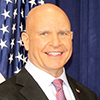
H.R. McMaster is the Fouad and Michelle Ajami Senior Fellow at the Hoover Institution, Stanford University. He is also the Bernard and Susan Liautaud Fellow at the Freeman Spogli Institute and lecturer at Stanford University’s Graduate School of Business. He was the 25th assistant to the president for National Security Affairs. Upon graduation from the United States Military Academy in 1984, McMaster served as a commissioned officer in the United States Army for thirty-four years before retiring as a Lieutenant General in June 2018.







